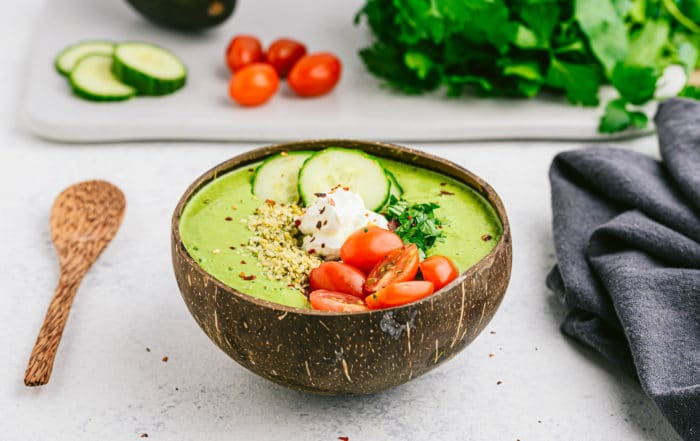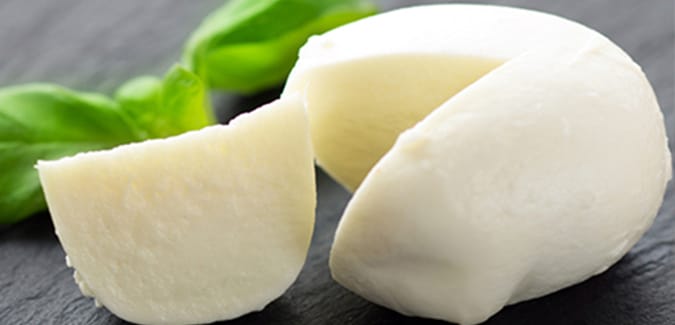All About Cottage Cheese
Cottage cheese is a soft, fresh cheese—it’s not aged or ripened like a hard cheese. It has a mild, creamy taste and a hearty texture, making it a versatile ingredient in the kitchen. But is cottage cheese good for you? In many ways, absolutely.
Origin of Cottage Cheese
It’s thought that cottage cheese was the first cheese brought to America by European immigrants in the mid-1800s. In an effort to reduce food waste, farmers ate the curds and whey that remained after making fresh farmhouse cheese with naturally soured milk.
During World War I, cottage cheese was also promoted as a nutritious, protein-rich, and affordable alternative to animal protein, which was rationed and in limited supply due to food shortages.
What is Cottage Cheese, and How is it Made?
One of the most notable aspects of cottage cheese is its pebbly texture of small and large curds. Cottage cheese is made of milk, salt, and acid. When an acid is added to milk, it causes curds of casein protein to separate from the whey, or the liquid part of the milk. Then the curds are cut, pressed, and rinsed before salt and cream are added to enhance the flavor and texture. The finished product is then packaged and becomes available on a supermarket shelf near you.
Cottage Cheese’s Nutrition Profile
On the nutrition front, a half-cup serving of low-fat (2%) plain cottage cheese contains around 90 calories, 5 grams of carbohydrates, 12 grams of protein, and 2.5 grams of total fat. It also supplies essential vitamins and minerals like phosphorus, potassium, calcium, and vitamin B12.
Cottage cheese is also available in nonfat and full-fat (4%) varieties. When comparing the types, it’s important to note that the calorie and fat content aren’t drastically different per serving. For example, from nonfat to full fat, the calorie savings is only around 30 calories and from low-fat to full-fat, the fat savings is only around two grams.
Cottage cheese tends to be higher in sodium, so take note of the nutrition label when making your selection at the supermarket and choose a lower-sodium brand.
Is Cottage Cheese Good for Your Health?
Bone Health
Dairy foods, like cottage cheese, play a key role in building and maintaining healthy bones over your entire life, from early childhood to late adulthood. They are also linked to overall bone maintenance and lower risk for fractures during the aging process. Key minerals in cottage cheese that promote bone health include calcium, vitamin D, phosphorus, potassium, and magnesium.
Muscle Development
Cottage cheese is a good source of high-quality protein that’s vital to building, repairing, and restoring muscle tissues. Protein also helps to strengthen and protect your bones. Because the whey protein in cottage cheese is removed in processing, it consists of nearly 80% casein protein. This type of protein takes longer to digest, which may help promote feelings of satiety and appetite control, as well as preventing post-exercise muscle breakdown.
Blood Sugar Control
With its modest amount of carbohydrates per serving, around five grams, and no added sugar, plain cottage cheese is a sensible choice for people who need to monitor their blood sugar. Again, because of its ample protein content, which slows digestion, it helps to promote blood sugar control while preventing spikes. When shopping, be mindful of cottage cheese products that contain fruit or other ingredients that may contribute added sugar.
Gut Health
When cottage cheese is made by adding an acid-producing culture (bacteria) to the milk, as in yogurt production, the cottage cheese will contain beneficial gut-health supporting probiotics, a.k.a., good bacteria. Make sure the phrase “live and active cultures” appears on the label, indicating a cottage cheese brand that contains probiotics.
Clever Uses for Cottage Cheese
Cottage cheese is versatile enough to eat alone, with sweet or savory toppings, and even used in recipes. Here are a few cottage cheese uses to try in your own kitchen.
Spread it
Replace your typical toast topper with cottage cheese, then layer with sliced berries, toasted walnuts, and a drizzle of honey.
Dip it
Add savory flavors, like freshly chopped chives, garlic, everything bagel seasoning blend, or pesto to cottage cheese and serve alongside fresh veggies, whole-grain crackers or flatbreads.
Top it
Transform overnight or cooked oatmeal with a dollop of cottage cheese for an added protein boost.
Blend it
Stir a few spoonfuls of cottage cheese into smoothies to amp up the protein content while giving it a creamier texture.


